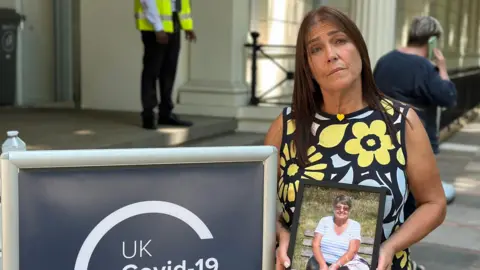Covid inquiry hears of care home 'slaughter'
 Getty Images
Getty ImagesA civil servant's assertion that there was a "generational slaughter within care homes" in the early days of the pandemic is a phrase that "chimes with the experience of thousands of our families", the Covid inquiry has heard.
Pete Weatherby, barrister for the campaign group Covid-19 Bereaved Families for Justice UK, said the phrase might seem an exaggeration but it highlighted issues the inquiry must address.
His opening statement came on the first day of the sixth part of the Covid inquiry which will focus on the impact of the pandemic on care services for elderly and disabled people.
The government has said it is committed to learning lessons from the inquiry.
Senior civil servant Alasdair Donaldson made the comment about generational slaughter in his written evidence to the inquiry, Mr Weatherby said.
Mr Donaldson's evidence also describes "complete chaos" in the Department of Health and Social Care when he started working there in April 2020, soon after the start of the pandemic.
Mr Weatherby urged the inquiry to call Mr Donaldson to give evidence in person.
Nearly 46,000 care home residents died with Covid in England and Wales between March 2020 and January 2022, many of them in the early weeks of the pandemic.
Key questions the families hope the inquiry will answer include why the decision was made in March 2020 to rapidly discharge some hospital patients into care homes.
They blame this in part for seeding the virus into care homes in the early weeks of the pandemic.
There are also questions about blanket "do not resuscitate" notices being placed on some care home residents by medical services and about visiting policies which prevented families seeing their loved ones for months.
The hearing began with filmed testimony from people who lost loved ones during the pandemic.
Ann, from Wales, told the Inquiry's Every Story Matters project that her dad, who had dementia, was living in a care home when the pandemic hit.
When visits were limited "he didn't have the understanding of why we were outside his window," she said.
He became increasingly confused, tearful and begging to be allowed to die.
When he eventually passed away, Ann was told of his death via a phone call in the middle of the night.
Julie from Yorkshire said she would "never come to terms" with the way her mother had passed away - sedated and alone.
"There are so many of us that will never move on. It will be with us for the rest of our lives," she said.
And she added: "Things have to change. This is not right - you should have death in dignity."
Nicky Hastie attended the inquiry in person on Monday, clutching a photo of her mother Margaret.
Nicky says she spotted that her mother was dying from Covid on a video call before staff had noticed, and described that time as "traumatic".
"She didn't die with dignity and there was no alleviation for her pain and suffering," she told BBC News.
The barrister to the inquiry Jacqueline Carey KC set out the scope of the hearings, warning this section would undoubtedly be "emotive and distressing for many people participating in, and following, these proceedings".
Ms Carey also highlighted Every Story Matters testimony from care home workers.
She quoted a worker at a Durham care home who described how the virus "spread like wildfire".
"At one point, 67 out of 87 residents tested positive, as well as a high percentage of our staff.
"We were all terrified we would take the virus home to our families," the care worker said.
In particular, Ms Carey said the inquiry would investigate understaffing in care homes and the plight of care workers, many of whom were on the national minimum wage, and also migrant workers.
Even before the pandemic, the state of the care sector "was fragile", Ms Carey told the hearing.
Covid testing capacity was extremely limited, particularly at the start of the pandemic where testing was limited to people who had symptoms.
The inquiry will also look at the shortage of personal protective equipment (PPE) in care homes.
Not only were supplies of PPE very hard to get, there were issues of whether staff had been trained to use it and, when it finally arrived, some of it was not fit for purpose, with straps that kept breaking, for example.
This part of the inquiry is expected to last five weeks.
It will hear evidence from bereaved relatives, disabled people, care worker associations and organisations representing care providers, as well as trade unions and local government.
